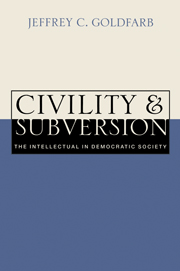Book contents
- Frontmatter
- Contents
- Acknowledgments
- 1 Introduction: the intellectuals at century's end
- 2 Who are the intellectuals?
- 3 The civil intellectual and the public
- 4 The subversive intellectual and the public
- 5 The civil society ideal
- 6 The intellectuals and the politics of culture after communism
- 7 The university
- 8 Race and discursive disruption
- 9 Race and sustained deliberation
- 10 Why is there no feminism after communism?
- 11 Civility and subversion in cynical times
- Notes
- Bibliography
- Index
1 - Introduction: the intellectuals at century's end
Published online by Cambridge University Press: 06 July 2010
- Frontmatter
- Contents
- Acknowledgments
- 1 Introduction: the intellectuals at century's end
- 2 Who are the intellectuals?
- 3 The civil intellectual and the public
- 4 The subversive intellectual and the public
- 5 The civil society ideal
- 6 The intellectuals and the politics of culture after communism
- 7 The university
- 8 Race and discursive disruption
- 9 Race and sustained deliberation
- 10 Why is there no feminism after communism?
- 11 Civility and subversion in cynical times
- Notes
- Bibliography
- Index
Summary
I believe that intellectuals have played crucial roles in the making of democracy and in the ongoing practices of democratic life. I further believe that the diminution of intellectual activity presents a major threat to democracy in our times. Intellectuals are central democratic actors, and when they leave the political stage, democratic performance ends in failure. I have such beliefs, and judge that they are especially pressing nowadays, because I perceive that intellectuals are particularly able to address one of the most pressing needs of democracies: the need to deliberate about common problems.
Intellectuals help societies talk about their problems. They contribute to a democratic life when they civilize political contestation and when they subvert complacent consensus; when they provide enemies with the discursive possibility to become opponents and when they facilitate public deliberations about problems buried by the norms of civility. This is the primary thesis of this inquiry. Intellectuals are key democratic agents as they stimulate informed discussion about pressing social problems, fulfilling this role by cultivating civility in public life and promoting the subversion of restrictive common sense.
In order to explore this primary thesis adequately, we will consider in this investigation the dilemmas and complexities of intellectual action in democratic society. I will attempt to depict the intellectual as a distinct type of social actor (chapter 2) and show how he or she establishes a field for social action in public (chapters 3 and 4).
- Type
- Chapter
- Information
- Civility and SubversionThe Intellectual in Democratic Society, pp. 1 - 19Publisher: Cambridge University PressPrint publication year: 1998



